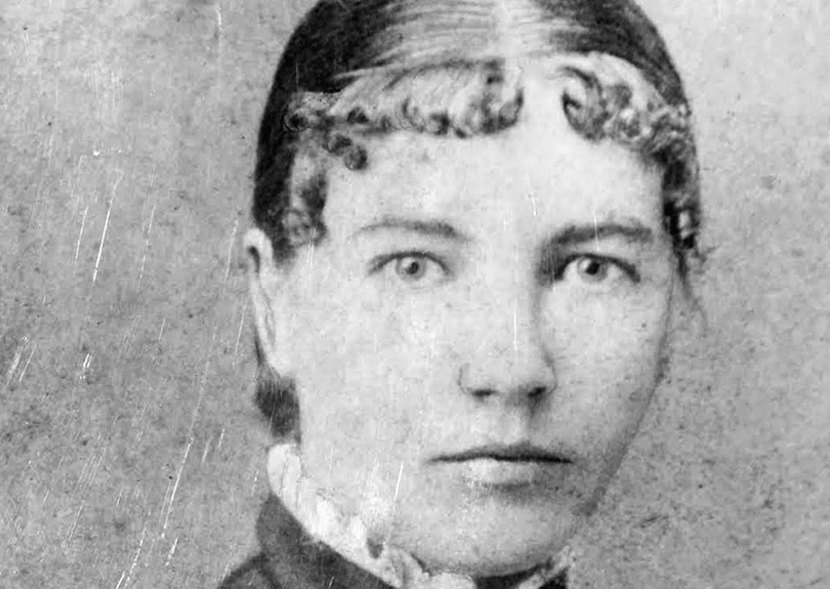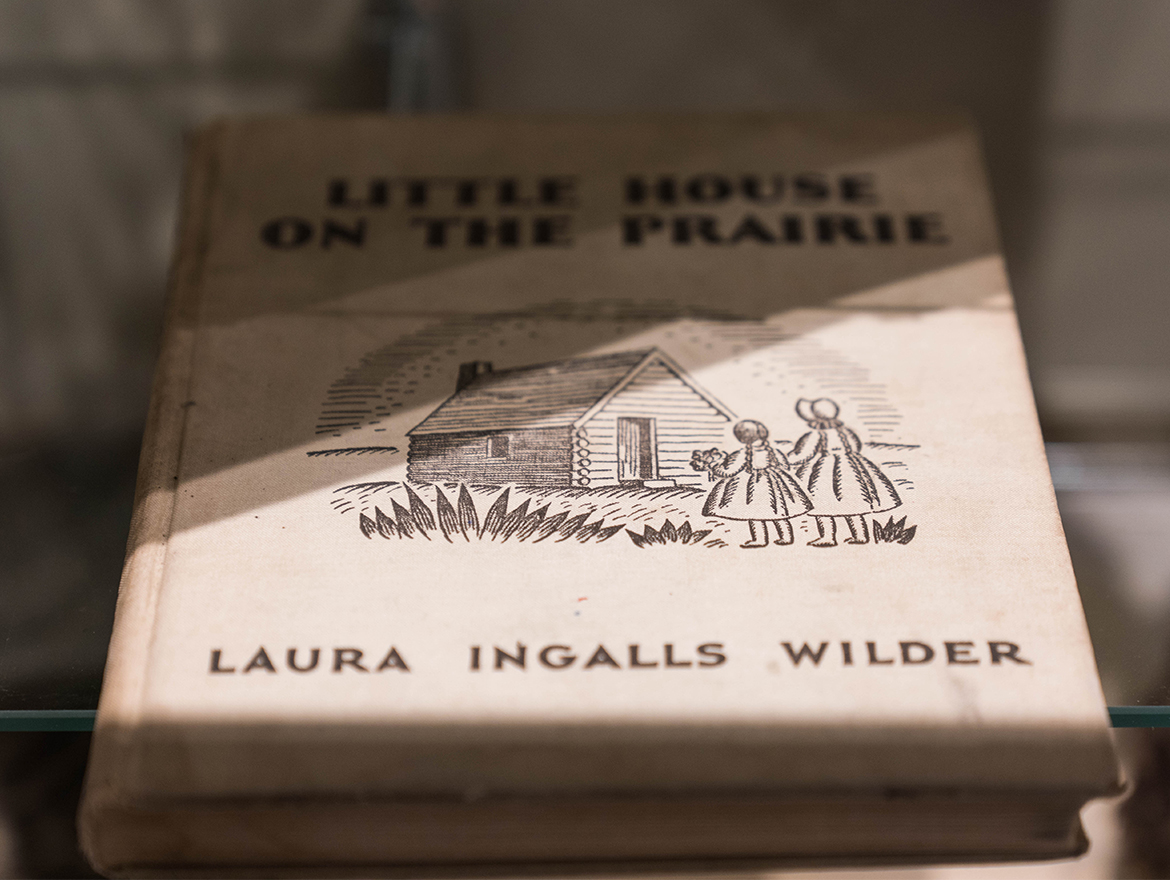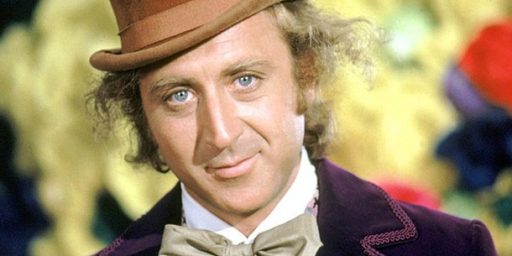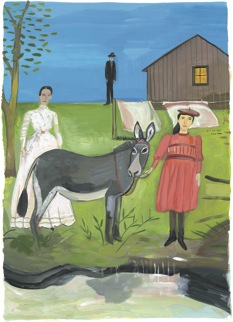Laura Ingall Wilder’s Name Stripped from Children’s Book Award
A pioneer woman born in 1867 depicted American Indians and African-Americans in ways that are cringe-worthy today.

WaPo (“Laura Ingalls Wilder’s name stripped from children’s book award over ‘Little House’ depictions of Native Americans“):
Laura Ingalls Wilder was on the brink of having an award named in her honor, from the Association for Library Service to Children, when in 1952 a reader complained to the publisher of “Little House on the Prairie” about what the reader found to be a deeply offensive statement about Native Americans.
The reader pointed specifically to the book’s opening chapter, “Going West.” The 1935 tale of a pioneering family seeking unvarnished, unoccupied land opens with a character named Pa, modeled after Wilder’s own father, who tells of his desire to go “where the wild animals lived without being afraid.” Where “the land was level, and there were no trees.”
And where “there were no people. Only Indians lived there.”
The editor at Harper’s who received the reader’s complaint wrote back saying it was “unbelievable” to her that not a single person at Harper’s ever noticed, for nearly 20 years, that the sentence appeared to imply that Native Americans were not people, according to a 2007 biography of Wilder by Pamela Smith Hill.
Yet Harper’s decision in 1953 to change “people” to “settlers” in the offending sentence did little to quell the critics in later decades, who began describing Wilder’s depictions of Native Americans and some African Americans — and her story lines evoking white settlers’ Manifest Destiny beliefs — as racist.
Now, after years of complaints, the Association for Library Service to Children, a division of the American Library Association, says it voted Saturday to strip Wilder’s name from the award.
The decision makes Wilder the latest target of efforts to purge from the cultural landscape symbols that honor historical figures who owned slaves, espoused racist views or engaged in racist practices. Statues and flags have been removed and highways renamed across the country. Coats of arms and building names have been changed or are the object of protests to get them changed. Columbus Day is now Indigenous Peoples’ Day in some places.
In its decision to remove Wilder’s name from the award, the library association had cited “anti-Native and anti-Black sentiments in her work” when it announced the review of Wilder’s award in February. The award, reserved for authors or illustrators who have made “significant and lasting contribution to children’s literature,” will no longer be called the Laura Ingalls Wilder Award. It’s now the Children’s Literature Legacy Award.
This is truly a shame. Not only was Wilder a great American novelist, she was one of the first women in that category. Moreover, her Little House books helped bring generations of children to a love of reading. I was born almost a decade after she died and read several of those books, mostly inspired by the NBC television series based on them.

In yesterday’s discussion of Alexandria, Virginia’s decision to remove Jefferson Davis’ name from a major highway, novelist and regular OTB commenter Michael Reynolds offered this test: “[D]id the person in question have reason to believe he was behaving badly?” My own standard is somewhat more lenient, in that “have reason to believe” essentially requires people to immediately change their ideas or behavior once a debate has begun, not once it’s settled.
By either standard, though, Wilders should be excused. I would submit that a woman born just after the Civil War, writing during the Great Depression, having spent most of her life in the American frontier and the Midwest, was going to have views of the American Indian and African Americans that are cringe-worthy today. She wasn’t a member of the Ku Klux Klan or an anti-Indian activist; she was just a woman of her time.
As noted earlier, I read several of the Little House books circa 1975, at which time I was 9 or so. I don’t recall them being particularly jarring. Reading some of the words four-plus decades later, though, they certainly are:
Born just after the Civil War in 1867 and having lived through both the Panic of 1893 and the Great Depression in the 1930s, Wilder once acknowledged “in my own life I represented a whole period of American history.”
But by the same measure, critics say, her family’s intrusion on Native American lands, particularly in “Little House on the Prairie,” represented a whole period of abuse against tribes across the United States, justified by white settlers’ belief that Native Americans didn’t count as settlers on their own land.
The book includes multiple statements from characters saying, “The only good Indian is a dead Indian.” In 1998, an 8-year-old girl on the Upper Sioux Reservation was so disturbed after hearing her teacher read the statement aloud in class that she went home crying, leading her mother to unsuccessfully petition the school district to ban the book from its curriculum.
Elsewhere in the book, Osage tribe members are sometimes depicted as animalistic, notes the critic Philip Heldrich: In one scene, Wilder describes them as wearing a “leather thong” with “the furry skin of a small animal” hanging down in front, making “harsh sounds” and having “bold and fierce” faces with “black eyes.” Although Laura’s father espouses a more tolerant view of Native Americans, his description of a “good Indian” is one who is “no common trash.”
The character who is Laura Ingalls’s mother, Caroline Ingalls, is not subtle in her hatred of Native Americans, saying repeatedly that she doesn’t like them before she has even encountered them. As the critic Ann Romines wrote, “Indians become a code for everything that seems to threaten the settled, white life she wants for her daughters.”
In addition, in another scene, Wilder depicts white men wearing blackface for the entertainment of others — including her father.
Of course, Charles and Caroline Ingalls are historical people. Depicting them as saying things that are clearly objectionable in hindsight doesn’t strike me as problematic; that’s simply how they—and a lot of people—thought at the time. And, looking back as an adult telling a story about one’s childhood, it’s perfectly natural to describe things that were truly scary to the child in vivid ways.
Still, one can certainly sympathize with Sioux and African-American children reading those books. But that’s true of Huckleberry Finn and Tom Sawyer, too. Samuel Clemons was a liberal in his day; he’s a virulent racist through today’s lens.
Still, Caroline Fraser, author of “Prairie Fires: The American Dreams of Laura Ingalls Wilder,” argued that the racial insensitivity in Wilder’s book shouldn’t mean that children shouldn’t read it.
In a March column for The Washington Post, after the association announced it was considering stripping Wilder’s name from the award, Fraser argued that the library association “evokes the anodyne view of literature” that it has fought against, and that no book, “including the Bible, has ever been ‘universally embraced.’ ”
“Each generation revises the literary canon. While the answer to racism is not to impose purity retroactively or to disappear titles from shelves, no 8-year-old Dakota child should have to listen to an uncritical reading of ‘Little House on the Prairie,” she wrote.
“But no white American should be able to avoid the history it has to tell.”
I think that’s right. Societies, thankfully, evolve. Too slowly, perhaps. But we really shouldn’t demonize people of the distant past for being creatures of their times.
To be sure, the standard for veneration is higher than that for toleration. Wilder’s lasting impact on the children’s literature canon merits the honor. Her failure to embrace the most progressive conceivable views in her age no more disqualifies her from having a kidlit award named after her than does Theodor Geisel’s embrace of Japanese internment camps.





I’ve mentioned this anecdote before, but Edgar Allan Poe’s “The Gold Bug” features a depiction of a plantation slave that looks pretty offensive today, but the first time I encountered the story as a kid was a bowdlerized version in which the character is referred to as a “servant,” his patois is translated into Standard English, and the sketchy illustrations make his features ambiguous enough that he might be Caucasian. When I got around to reading the original story, its content came as a shock to me.
I happen to be strongly against bowdlerization, which in some ways I find worse than outright censorship. But either way, a good majority of Western literature before the 20th century–and even a considerable amount from the 20th century-isn’t going to pass the test of “Does it contain content that we today would find offensive?”
I just read this:
https://www.theroot.com/%5Bobject%20Object%5D
… which dericisively describes your argument as “presentism”—the idea that we shouldn’t judge the actions of people in the past using modern-day standards.
I can’t agree with the writer of that piece quite yet. Otherwise I’m going to be a monster someday for something that I don’t even realize right now. (Maybe it’ll be for stepping on ants and we’ll discover their acute sense of pain in the future, which is entirely predictable actually.)
Anyway, right now I agree this is stupid.
Mark Twain was a generation older, and he was capable of this kind of pointed sarcasm:
“It warn’t the grounding – that didn’t keep us back but a little. We blowed out a cylinder-head.”
“Good gracious! anybody hurt?”
“No’m. Killed a n*****.”
“Well, it’s lucky; because sometimes people do get hurt.”
Name the award after him instead.
Kidlit has become a very unpleasant place. I’ve fought battles like this within the kidlit ‘community’ and absolutely lost. I don’t know how much these ignoramuses will affect the larger culture, but I’m out of kidlit. I’m not a joiner or a ‘member of’ anything, I have no roots, so when I don’t like or get bored with the place I’m living, I move. When I find myself standing in a crowd whose goals and tactics stray too far from what I consider reasonable behavior, I exit that group.
I’ve made the move successfully (though I’m taking a big haircut in terms of income) to writing adult books and don’t expect to return to kidlit. I still have two books in the pipeline but I’ve refused all invitations to speak or appear, and I know of several successful kidlit writers doing the same.
A fair point. I am extremely impatient with people who, once shown that 2+2=4 continue to insist that the answer is 5. An almost complete lack of attachment leaves me unusually flexible, and a devotion to reason does tend to blind me to the notion of loyalty to a discredited idea. And I find it impossible to write under conditions of censorship, whether imposed by government or by a mob of not-terribly-bright English majors.
But onward and upward. A SUDDEN DEATH IN CYPRUS drops in October. The follow-on set in Amsterdam will come out a year later. I’m also at work on several other adult projects and feeling wonderfully liberated and re-energized.
Geisel’s racism (which he later apologized for) happened in the context of his largely forgotten career as a political cartoonist, before he became a children’s author. None of his celebrated books like Cat in the Hat, The Lorax, Horton Hears a Who, etc. contain any racist content. (Indeed, he was a staunch liberal who was generally very critical of racism throughout his career, both in his political works and in his books for children. He evolved on the matter, just like Dickens evolved on anti-Semitism.) That makes a difference in how he’s viewed compared to someone where the racist depictions occur in some of the very works they’re famous for.
Honestly, this is starting to sound like the Soviet deleting dead cosmonauts from official photos.
Laura Ingalls Wilder was a woman of her time and (IMHO) should be judged by the common attitudes and morals of her time.
Otherwise, we’ll find ourselves wiping 95% of authors out of literature. If we get rid of all literature that has racist or sexist dialog/attitudes in it, we’ll be getting rid of 95% of literature. I remember as a kid reading stuff that would be considered quite racist now–I just muttered “interesting” and bleeped over it. I find that tagging something with “well, that was the standard belief back then” mentally cuts back one’s outrage considerably.
(And “presentism”? Looks like someone is looking for an excuse to reduce her library to a collection of See Dick Run books. Except that she’d probably be throwing a fit about those as well.)
@Michael Reynolds: I remember running across someone who was having a fit about Patricia Wrede’s “Thirteenth Child” YA trilogy. Said hissy-fit was about the lack of Amerindians in the story. Since the trilogy is sort of a retelling of the settlement of the American West but set in an alternate universe with MAGIC and DRAGONS it really was a face-plant moment for me.
@Franklin:
When I clicked on your link, I got a 404/No posts found for this blog message.
@CSK: Oops, I don’t know where that other link came from … https://www.theroot.com/white-people-are-cowards-1826958780
@Michael Reynolds:
But 2+2 does =5 for extremely large values of 2.
James, I think you may be conflating two things: whether this reveals Wilder was a terrible person (certainly not, for the reasons you outlined) and whether a prestigious book award should be named for her. On the latter, I think time moves on and situations change. Deciding to rename the award keeps the emphasis on the award and not on the person for which it is named. They use this award to praise children’s books, not Wilder.
I disagree about Twain being a racist even by today’s standards, although I do think it is unwise to make Huckleberry Finn part of a school curriculum until college or perhaps an AP lit course. Understanding what he set out to do takes a degree of sophistication not often found in teens. And although “Uncle Tom’s Cabin” is more often thought of as instrumental in changing America’s view on slavery I would argue that Huckleberry had a more subtle and long lasting effect on how we view black/white racism and racism and classism in general. It features two characters, Huck and Jim, both of whom are raised without education or decent treatment, neither of whom has any great self awareness or intellect, but instead have a fair degree of practical and situational ethics and sense. And throughout the whole book, at every bend in the Mississippi we see how the lives of these two brothers-by-different-parents play out simply because one is white and one is black, one is “free” and one is a slave. Twain didn’t whack his readers with a morality stick, but rather set a story in their heads and let it work its way in deep. For instance, the way good Aunt Polly felt her heart go out to lyin’ ramshackle Huck and wanted to clean him up and bring him into her home, while she was willing to sell her long time and, till then, faithful servant into misery and torment. Twain didn’t say “LOOK! LOOK! THE INJUSTICE!” Instead he told you how Huck and Jim felt as people, in such a way that we felt we knew them, that “there but for the grace of god go I”. Stowe was crucial for her time, but her characters were stock, her black characters especially were unworldly Saints, defenseless, pathetic and weak. That portrayal no longer holds up, and the story reads as more or less ridiculous melodrama, but “Huck” still holds together as a story, and while it no longer is an accurate representation of black/white relations it is certainly still an insight into poverty and prejudice and the yearning to be one’s own person.
I’m reminded of a story the late Robert B. Parker told about being interviewed on the radio when his first novel, The Godwulf Manuscript, was published. The host immediately attacked him for not having any black characters. Parker calmly pointed out that in chapter eight, he introduces a black female character, Iris Milford, who becomes a significant figure in the story.
It’s true, as Michael Reynolds knows, that interviewers often don’t read the books, but this incident was unusually ludicrous.
@Franklin: The worst thing that ever happened to iO9 and Gizmodo was the sudden influx of the crowd from Gawker, the Root, etc when they went bankrupt. You would be hard pressed to find a more humorless bunch of scolds and finger wavers outside a college campus.
@Kylopod:
When I first read Alcott’s Little Women and then re-read it, I was struck by how much she disliked the English (the men snobbish, foppish, caddish; the women flighty, snobbish, and inconsequential) and much she adored the Germans (wholesome, fresh, natural, straightforward, strong). And of course Jo March ends up marrying a German. Amy is wooed by an Englishman, but ends up with the boy next door in Concord.
Louisa herself was smitten by a Polish cavalryman when she did her nursing stint during the Civil War, but declined to wed him, preferring to “paddle her own canoe.”
@MarkedMan:
Right. I get at that a bit in the last paragraph. But, if she’s not a terrible person by the standards of her day, then it follows that we should judge whether naming of the award after her on her impact on the field. In that light, it may be that we ought rename it once the Little House books recede into the past and are no longer much read. But that’s not why they’re doing it.
@MarkedMan:
I’m not enough of a Twain scholar to really debate this. I agree with you on the criticisms of his racial portrayals in the books; they’re quite sophisticated and amazingly forward-thinking for their time. But I’d argue that pretty much every white in those days was a racist by modern standards. Twain would surely have been aghast at the idea of a black president or a black man sleeping with, much less marrying, a white woman. And that’s to say nothing of his views on Native Americans.
@Franklin: It should be noted that the author of that essay–where he castigates white people for sitting on their asses and doing little or nothing to combat racism in this country, including the Trump Administration’s Nazi-like policies toward immigrants–did not vote for Hillary Clinton.
@James Joyner: I’m going to have to track down “The Noble Red Man”. The article really didn’t give any significant example of racism towards American Indians, but I wouldn’t be surprised if it did, merely disappointed. He certainly used language that was acceptable in the day that is not acceptable now. But I can’t fault him for that. In my youth if one were to refer to someone by race (ex: “That tall black man over there”) it was preferred to say “Negro” or “Colored”. Today those terms are considered insulting (NAACP notwithstanding). But Twain was also a cantankerous and, especially in his old age, a fairly embittered man. He lashed out and was intemperate at many occasions throughout his life. And, of course, he could have lacked insight into the American Indian condition despite having keen insight into others.
@Kylopod:
It’s a really weird essay. Still, in fairness, he points out that “That’s not how the Electoral College works.” According to his Twitter bio, he’s from Birmingham, Alabama. If he, in fact, lives there, then he was indeed powerless to alter the election outcome. (Ditto, if he lives in New York or DC.) If you don’t live in a swing state, then being “petty” or casting protest votes is morally defensible, I think.
We need to be very wary of judging people from the past by today’s standards.
I am always reminded of L.P.Hartley’s quote.
“The past is a foreign country; they do things differently there.”
As someone who reads history books for fun, I’m often frustrated with the attitudes and words of people in the past.
For instance, many Greeks in ancient times believed sperm contained, essentially, a homunculus which would grow inside a woman’s womb. The belief was that women were nothing but incubators, contributing nothing to the conception fo a new person.
One has to wonder whether they did not notice a resemblance to the mother as well as the father of every child ever born. So one may spin this belief as ignorance, but given evidence to the contrary clearly available, I say it was prejudice.
@James Joyner: Even if he lived in Wisconsin, his individual vote in itself wouldn’t have made a difference to the outcome. The point is that he joined a chorus of commentators and activists who didn’t view Donald Trump as enough of a danger to advocate that the priority was making sure he didn’t become president. He complained (correctly in my view, though some of his examples were distorted or false) that Hillary Clinton had a less-than-pristine record on race. But Hillary Clinton was not the candidate promising to deport the nation’s 11 million undocumented immigrants. So when he now criticizes white people for tut-tutting without doing anything material to combat the concentration camps (a misplaced critique if I ever heard one), that strikes me as pretty hypocritical.
Dr. Suess is generally praised for “The Cat In The Hat” rather than “The Jap In The Internment Camp” — his work stands apart from his unfortunate beliefs. Wilder’s work is tied into those beliefs, and the romanticism of stealing Native American lands.
Do we choose to extol that whitewashing of our history?
I hope not. I’d rather we didn’t.
In Brazil there is a REAL problem with that because the most known kidlit writer in the country was openly racist to the point of praising the KKK and writing racist speeches for the most known character in his books.
Whatever Dr. Seuss did is peanuts when compared to that.
@grumpy realist:
The exhortation “Run Dick Run!” is extremely ableist.
@MarkedMan:
That’s what the teacher is for — to show and teach that sophistication, and get those teens thinking that way.
I wouldn’t want to restrict the ideas of “Huckleberry Finn” to college kids — I mean, only 54% go to college. The ideas in “Huckleberry Finn” are universally applicable, and should be taught before weeding out almost half of the population.
There might be a better book with the same themes, but this one is fine other than the n-word. One lesson to put that in context, and go from there.
(There was a nice version a few years back, where the n-word was replaced by “robot”, and there were illustrations with Robot Jim on the raft. It was delightfully absurd, and one of the few times I approved of Bowdlerizations)
@Gustopher: I used to think as you do, but some years ago happened to be listening to a Diane Rehm show on this topic when a black man called in. I think he was in his late twenties. And he expressed the pain of being one of the few black kids in a class that was studying “Huckleberry Finn”. Kids would mimic the characters way of speaking to him in between classes. And during classroom readings there was a group of students who put an extra little emphasis on the N word, not so much as they could be called out, but enough to know it was mockery. He viewed the teacher as well intentioned but naive. Even after all those years he started getting wound up talking about it.
“Huckleberry Finn” is still on the reading lists of many schools. That is good.
I look for some misguided group or person to push for awards to be taken from “Gone With the Wind”
Attacks on George Washington are increasing.
Our grandchildren someday will probably visit a Washington, D. C. with no monuments.
I limit re-writing history to the literary genre of alternate history.
That said, justa bout every history book, lecture and podcast on the subject, mentions explicitly how crummy the attitudes of historical figures could be. Many explicitly warn against moral judgments by present standards.
Do we stop studying history?
Hell, no. But we can judge, and find out why and how we got to where we are. When I listened to Trojan War The Podcast, by Jeff Wright, I came to the conclusion that aside from (mostly) Hector, everyone else was either an asshole or a douchebag (Hector has his big asshole moment after he kills Patroclus and strips Achilles’ armor off him), and I don’t give one single tiny f**k whether that was the culture of the time or not.
Now, I know much of the Trojan War story is fictional, if not all of it. But it is Greece’s foundational myth, and that tells you what sort of people the ancient Greeks approved of, and admired, and why they did.
But it is a very dramatic, very interesting, very compelling story. And very tragic and with a very depressing ending.
Well, I certainly look forward to the day a few generations hence when any author from today whose books include casual references to a tasty BBQ steak, juicy hamburger, fresh sushi, etc. is rightly shunned and memory-holed for conveying such barbaric acceptance/endorsement of animal suffering.
@R. Dave: In fact I’d take that a stage further.
Most people seeing me would identify me as white which I most assuredly am not – I am porcine coloured, pink if you will.
Maybe we should rebrand now as the pink race which would have the dual advantages of being more factually accurate and driving the supremacists into a state of apoplectic fury.
It is not inconceivable that a hundred years from now any reference to whites might be construed as an example of an unmitigated and unforgivable racist slur against non-pinkos.
@Nick Nelson: I once read an ethnographic study of Ethiopian Jews, also called Beta Israel, and it revealed that some of them hold racist views against black people. They don’t view themselves as black, however; they consider themselves “red.” (Here is a picture of Beta Israel.) That may seem strange and contradictory, but the fact is their color classification is no more artificial than ours. No human being is literally “black” or “white.” In fact just about any standard crayon color (black, brown, yellow, red, pink, white) is insufficient to describe the complex coloration of human skin pigmentation. The ones we use are nothing more than conventions created by Westerners and imposed on everyone (including themselves).
Its pointless to judge people other than by the standards of their time. As a friend of mine says, every BSc in physics can solve physics problems Isaac Newton couldn’t even get started on because of how much our knowledge has advanced. That doesn’t mean Newton was a poor physicists, just that our understanding has progressed.
As a further point, my guess its more white people than indigenous or black people who have a problem with naming an award after her (though of course there will be indigenous and black people who will have a problem). Fair treatment today is important, re-writing the past much less so.